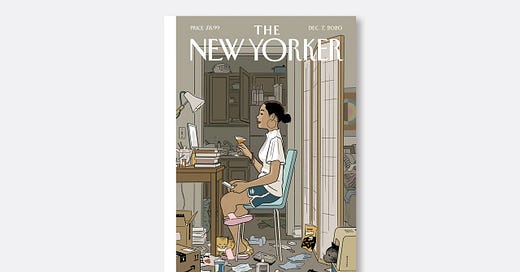Humans fear death. We elect for life saving measures in old age, and throughout life, we take any precaution we can to increase the number of years we will be alive. At every turn, we try to cheat death.
Reactions to COVID put this fear into stark relief. The fear of death was so strong that people were willing to forego, or outright ban, what it means to be alive in the name of preserving life. They were willing to give up holidays with loved ones, hikes in the wilderness, parties with friends, and afternoons at the playground. For many, it seemed to be alive was simply to have a pulse and breath.
Life during the lockdowns was in disarray, and mental health decay was not only acceptable, it was celebrated. Many connected with the New Yorker cover above. The shared experience of ordering takeout, procuring daily essentials from Amazon, and going through the motions of life in PJs was a means to connect with others, even though many of these new routines and behaviors were self-destructive. An Instagram post with a photo of a wine bottle and glass, for example, often had a caption that went something like this: "Oh, you uncorked your bottle of wine at 3pm? I opened my first bottle at noon, LOL!" Ironically, the slow crawl toward death via alcohol was acceptable, but attending a joyful family Christmas dinner was not.
The fear of death via COVID and resulting lockdowns changed the mood of cities and towns across the US. Even after everything reopened, people elected to stay home, continued ordering food for delivery, and picked up their daily needs of life at the curbside. Once lively towns and cities are now dead by 10pm, even on the weekends, and many people have yet to resume family gatherings over holidays.
Individuals have maintained a secluded life indoors. They have stopped living.
As Seneca asserted, death is human: "You were born for this, to lose and be lost, to hope and to fear, to disturb yourself and others, to fear death and to pray for it, and—worst of all—to never know what will happen to you."
A means to overcome the mundane, stagnant drumbeat of daily life under a looming cloud of death is to create new life. You can start a garden or nurture indoor plants, or, like me, you can have a baby.
The young remind us that the world is full of wonder, and that curiosity leads us to uncover the magnificent joys of life. New life revives holiday traditions and the magic that accompanies them. With the arrival of my baby girl, VV, came desires for extended family gathers, holiday movie marathons, and choreographed family photos—things that dissipated in the aftermath of COVID and in the absence of young family members.
Kids remind us what it means to be alive, distracting us from our fixation on death. Bringing new life into the world is important for many reasons. This is just one.
With the arrival of VV, I introduce another section of the EduThirdSpace Newsletter: "Education in the Mommiverse." In this section I will publish writing on what it means to get and be educated through the eyes of a parent.
Some posts will be available to all subscribers—paid and free—while others will only be available to paid subscribers. If you would like to opt-out of "Education in the Mommiverse" follow one of two steps:
Log into your Substack account, head to your "Settings," click on your EduThirdSpace subscription, and choose (check or uncheck) which sections you want to receive.
Click "unsubscribe" at the bottom of any email from EduThirdSpace, which takes you to a page where you can choose which sections to subscribe to.
Another newsletter update: I intended to make available narrated versions of select articles. While in the late stages of pregnancy, breathing became difficult, and now I have a baby who is liable to start screaming at any given moment. Thus, the "Narrated Articles" section of the newsletter is on pause indefinitely.
As always, thank you for subscribing to this newsletter; please share it with family, friends, and colleagues who care about education.




